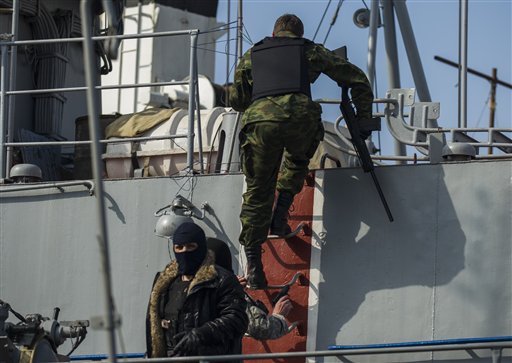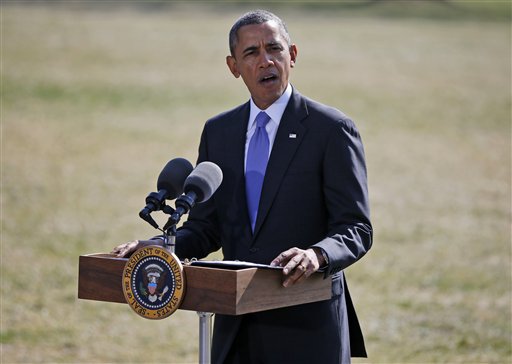Obama expands sanctions on Russia over crisis in Ukraine
Thursday, March 20, 2014
WASHINGTON - Seeking to intensify pressure on Russia, President Barack Obama on Thursday expanded U.S. economic sanctions against Moscow over its actions in Ukraine, targeting President Vladimir Putin's chief of staff and 19 other individuals as well as a Russian bank that provides them support.
Obama, warning of more costs to come for the Kremlin if the situation worsens, said he also had signed an executive order that would allow the U.S. to penalize key sectors of the Russian economy, including its huge energy business. Officials said Obama could act on that authority if Russian forces press into other areas of Ukraine, an escalation of the crisis in Crimea.
The president said the latest penalties were the result of "choices the Russian government has made, choices that have been rejected by the international community."
"Russia must know that further escalation will only isolate it further from the international community," Obama said, speaking from the South Lawn of the White House.
European Union leaders, too, said they would expand the number of people targeted with various sanctions and indicated they would cancel an EU-Russia summit. Chancellor Angela Merkel told the German parliament that if the crisis deepens in Crimea and Ukraine, the EU is prepared to move to economic sanctions on a higher level.
Russia retaliated quickly by imposing entry bans on American lawmakers and senior White House officials. Among them were Senate Majority Leader Harry Reid, D-Nev., and House Speaker John Boehner, R-Ohio. Obama's senior adviser Dan Pfeiffer and his deputy national security adviser, Ben Rhodes, were also targets of the Russian entry bans.
Boehner's office said the speaker was "proud to be included on a list of those willing to stand against Putin's aggression."
The new American sanctions hit close advisers to Putin, including Sergei Ivanov, the Russian president's chief of staff and a longtime associate. Also targeted were Arkady Rotenberg and Gennady Timchenko, both lifelong Putin friends whose companies have amassed billions of dollars in government contracts.
Also sanctioned: Bank Rossiya, a private bank that is owned by Yuri Kovalchuk, who is considered to be Putin's banker.
The U.S. sanctions followed a first round of U.S. economic penalties ordered earlier in the week on 11 people the U.S. said were involved in the dispute in Ukraine. Russia moved its military into Ukraine's Crimean Peninsula three weeks ago and has since formally annexed the strategically important region into its borders.
The U.S. has declared Russia's incursion into Crimea a violation of international law and does not recognize its annexation of the peninsula.
Still, U.S. officials privately acknowledge that Russia is unlikely to give up Crimea. Instead, their top priority is keeping Russia from moving into other areas of Ukraine with pro-Russian populations.
"The world is watching with grave concern as Russia has positioned its military in a way that could lead to further incursions into southern and eastern Ukraine," Obama said.
Senior administration officials said the individuals targeted by Thursday's sanctions will have assets frozen in the United States, will be barred from doing any business in the U.S. and will be unable to make transactions in American dollars. The officials said some of those sanctioned are close associates of Russian President Vladimir Putin.
Putin has not been personally targeted by the first two rounds of U.S. sanctions. American sanctions on heads of state are rare, largely reserved for instances where the U.S. is seeking a change in government leadership.
The dispute with Russia is expected to dominate Obama's trip to Europe next week. He'll chair a hastily arranged meeting of the Group of Seven, pointedly leaving out Russia, which often joins the U.S., Britain, France, Germany, Italy, Canada and Japan to comprise the Group of Eight.
Officials said the G-7 leaders will discuss what kind of financial assistance they can provide to the fledgling Ukrainian government. The G-7 nations have also suspended preparations for a G-8 summit that Russia is scheduled to host this summer in Sochi, site of the recently completed Winter Olympics.


